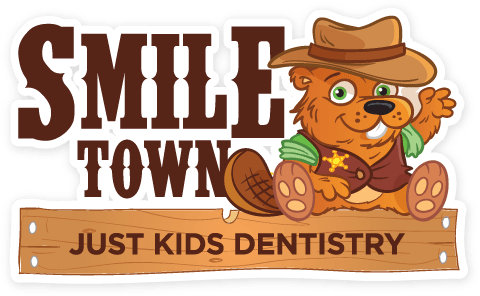FAQ
Frequently Asked Questions
Why does Smiletown want to see children before their first birthday?
Children who wait past their first birthday and do not see a dentist until age two or three are more likely to have subsequent preventive, restorative and emergency visits.
At SmileTown we want to see children before their first birthday for a first “well baby check.” This appointment is mostly educational and establishes a dental home for your child at one of our three locations in Cambridge, Waterloo and Guelph. We want to give our families the tools they need to help their children remain cavity free and maintain healthy oral health throughout their entire lives.
Children who are not seen until the ages of two or three are also more likely to have subsequent preventative, restorative and emergency visits. It is more common that their first visit will be due to an emergency, which will create more stress than necessary for your child.
The more frequent your child visits our kid-friendly dental office, the more comfortable and understanding your child will become with each visit.
Can I pass cavities to my child?
Yes! Babies can actually “catch” cavities from their caregivers. In 71 percent of the cases, the mother is the source. Research indicates that the cavity-causing bacteria known as streptococcus mutans can be transmitted from mothers to infants even before teeth erupt. This is just another reason that we promote entire family oral health and not just the importance for children. The better the mother’s oral health is, there is less chance the baby will develop oral health problems as he or she grows.
What about my child's pacifier?
Pacifier or thumb? Cloth or disposable? Breast milk or formula? Debates rage around new parents, just at a time when they’re too tired to tie their own shoes. The AAPD solves the first of these parent dilemmas with a vote for pacifiers over thumbs to comfort babies.
Pacifiers have a few rules of thumb, pun intended. The three things to consider are:
• Frequency (How often do they suck?);
• Duration (How long do they suck?);
• Intensity (Can you hear it across the room?)
Most children will stop on their own; however for some, extra assistance from parents and even children’s dentists are required. At each visit, our kid dental specialists will monitor how your child’s teeth are developing to ensure we are doing everything possible to set your child up for a lifetime of beautiful smiles.
Why fix primary teeth?
It is very important to have even your child’s primary or baby teeth fixed, should a problem arise. These important teeth hold space for their permanent teeth to grow in. Furthermore, a decayed tooth can become abscessed. This leads to pain, loss of school days and may lead to serious infections having far-reaching implications for growth, development, school performance and peer relationships. These teeth are also important in allowing your child to speak clearly and to chew freely and naturally without pain or discomfort.
Why is dental equipment large and overwhelming for children?
Just about all dental offices treat all sizes and shapes of patients with a broad range of needs. At SmileTown we offer kinder, gentler dentistry designed JUST FOR KIDS. Remember when children kicked and screamed their way to the dentist? Not anymore. SmileTown has more in common with a modern play-land than an old-fashioned doctor’s office. We do everything we can to provide a safe and stress-free dental experience for your child, it will leave you questioning – “If only dental visits were this much fun when you were a kid!”
What are the benefits of a healthy mouth?
There are no disadvantages of having a healthy mouth!
• A healthy mouth is attractive and can help children form a positive self-image. A bright smile can help win the confidence of peers and teachers.
• Healthy teeth save time and money. Good oral health means less extensive and less expensive treatment for your child.
• Healthy baby teeth hold space for permanent teeth and help guide them into the correct position. Severe decay and early loss of baby teeth can result in crowded, crooked permanent teeth.
• Children with healthy mouths have a better chance of general health because disease in the mouth can endanger the rest of the body.
Consequences of early childhood caries include insufficient physical development (especially height and weight) and a diminished ability to learn. An untreated cavity can lead to a necessary root canal treatment to alleviate pain and to treat the dental disease.
We could really go on all day about the benefits of a healthy mouth – but actions speak louder than words. Take a look at your smile – it’s beautiful right? Why wouldn’t you want that for your child as well?
It was suggested that my child receive dental sealants. How do they work?
Dental sealants are used to fill in any spaces on the chewing surfaces of your child’s teeth to stop a cavity from forming. This stops any food or bacteria from getting stuck within the teeth that sometimes simple brushing cannot reach. We simply “paint” the sealant on your child’s teeth with a small paint brush; it is quick and easy and can help protect their teeth for years to come.
I know fluoride is important, but how do I know if my child is getting the right amount?
This one is easy – speak to one of our SmileTown child-focused dental specialists to discuss your child’s fluoride intake. It is often as simple as evaluating your child’s primary source of drinking water to determine if additional fluoride is required. Children who drink primarily bottled water will often to be lacking in fluoride and require supplements. But please don’t make that call yourself! It is easy to consume too much fluoride through supplements, which can also cause oral health problems down the road. Let your kids dentist lead the way in your child’s fluoride treatment.
How often should my child see a kids dentist?
Like adults, we also encourage our younger patients to be seen by our kids dentists at SmileTown once every six months. Every child is different however, which is why you and your dentist can discuss a proper timeline for your child in order to prevent cavities and other dental problems from forming.

